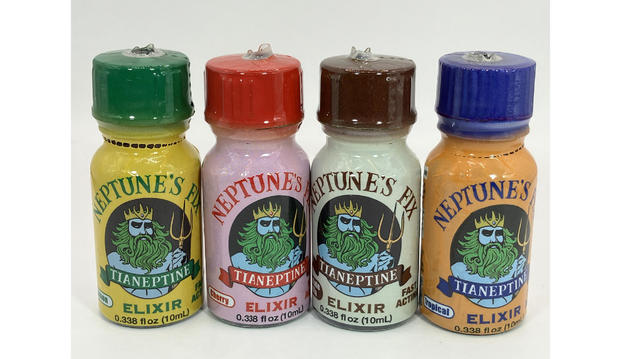
FDA warns about Neptune’s Fix supplements after reports of seizures and hospitalizations
The Food and Drug Administration is warning consumers not to use or purchase any products from the supplement brand called Neptune’s Fix after receiving multiple reports of severe reactions, including seizures and hospitalizations. The FDA says it is testing samples for illegal and harmful ingredients.
Neptune’s Fix supplements purport to contain tianeptine, an opioid alternative prescribed as an antidepressant in some Latin American, Asian and European countries. Tianeptine is not approved for use in the U.S.
The FDA has previously warned about this “potentially dangerous” substance, which the agency says has been linked to addiction and deadly overdoses.
FDA
Now authorities worry other substances may also be mixed into these products, which are being sold illegally online and in retailers like gas stations and vape or smoke shops.
said. Some required hospitalization. Others showed up at hospitals with a variety of other serious symptoms, including hallucinations and vomiting.
New Jersey’s poison control center has fielded 23 calls about tianeptine since June 17, Dalya Ewais of the state’s health department told CBS News, with more than half attributed to products sold under the Neptune’s Fix brand.
“The products were purchased at gas stations, a deli, a vape shop, a tobacco shop, convenience stores, and online. However, gas stations remain the most commonly reported location of purchase,” Ewais said in an email.
It is unclear which other states have reported issues with Neptune’s Fix to FDA or how long the agency’s testing of the products will take.
An FDA spokesperson was not able to immediately provide a response to a request for comment.
“Gas station heroin”
Authorities have moved to crack down on other tianeptine supplements in recent years, after the CDC reported in 2018 that poison control centers had been fielding a growing number of calls over tianeptine abuse and withdrawal from use of the drug.
Nicknamed “gas station heroin” due to its wide availability in convenience stores and other small retailers, several states have taken steps to curb sales of the drug. Other brands of tianeptine the FDA has previously warned about include Za Za and Tianna Red.
Florida’s attorney general announced an emergency rule in September to designate tianeptine as a Schedule I controlled substance in the state, after moves to tighten restrictions on the drug in Alabama, Georgia, Indiana, Kentucky, Michigan, Mississippi, Ohio and Tennessee.
Federal prosecutors have also gone after companies for smuggling and selling tianeptine products in the U.S.
Emergency rooms have reported surges in reports of users struggling over withdrawal from the drug in recent years, including after efforts to pull the product from store shelves.
Unlike typical antidepressants, the drug works by binding to the body’s mu opioid receptors, causing effects that mimic opioid toxicity and withdrawal. Similar to other opioids, naloxone has been used to manage tianeptine overdoses.
“We were having to put a lot of people in the intensive care units (ICUs) because the withdrawal symptoms were so bad and often included delirium requiring high doses of sedating medications,” Dr. William Rushton, head of the University of Alabama’s Medical Toxicology program, said in a post by the university.
Alexander Tin
Source: cbsnews.com